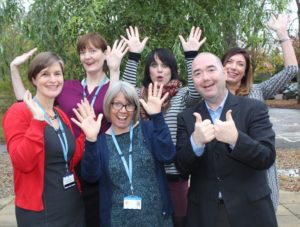Sue’s Post Board Blog
A blog from our Chair following the May Board meeting
Welcome to my first Post Board Blog where I’ll attempt to summarise what I hope will be some of the key items of interest to people from our Board of Directors meetings. This is part of an approach I’m taking to help people engage with the Board’s agenda and I’d welcome any feedback you might have on this (details below). This blog focuses on business discussed at the meeting on 25 May 2017.
Visit our Board meetings page to read the agenda and Board papers from the May 2017 meeting
Outstanding service
We were delighted to receive a verbal report from our Deaf Child and Adolescent Mental Health Service who were rated outstanding by the CQC in November last year (team pictured below). We heard from Tim Richardson, Vicci Ackroyd and Rebecca Hudson from the team who shared interesting insights into their work.
 They are committed to following best practice and using a clear evidence base to guide their work, which the CQC picked up on. However it was interesting to note that they are reported to be the only NHS service in the country that employs deaf interpreters. We agreed to look further into the role of interpreters and the service provided to users of our services across the trust.
They are committed to following best practice and using a clear evidence base to guide their work, which the CQC picked up on. However it was interesting to note that they are reported to be the only NHS service in the country that employs deaf interpreters. We agreed to look further into the role of interpreters and the service provided to users of our services across the trust.
What really struck me was the positive culture they’d developed within the multi-disciplinary team, where colleagues from different professions and positions working well together and helping each other. There seemed to be a culture where it was okay not to know something and seek that help out from anyone, as well as a culture of constructive challenge.
We’re keen to ensure that the elements of this positive culture are shared across other clinical teams, and Susan Tyler, Director of Workforce Development, is going to look into this.
Sharing Stories
The Board is privileged to hear personal stories from service users, carers, families and staff about their experiences of care with us. This is called “Sharing Stories” and we usually hear these in our private session – to provide a safe space for these stories to be heard and to protect the identity of those who do not wish to be identified.
I am keen to ensure we hear about the actions we’re taking when we hear such stories so we can demonstrate we can both listen and act on feedback as a Trust.
At our meeting on 27 April 2017 we heard from a woman who is a carer for her mother who uses our Older People’s service. She explained the difficulties that her mother experiences in dealing with her long-term mental health condition which is now compounded by the physical and mental effects of ageing.
She highlighted issues around access to medication records, choice of medication and better co-ordination between health and social care services. You can read more about what we did to address her concerns in Lynn Parkinson’s paper; item 8, page 37.
Workforce first
Our workforce is our greatest asset, and a critical part of what we do. It was therefore a surprise to me when I started as Chair to see that there wasn’t a regular workforce report coming to Board. This has been remedied, and the first such report was presented to the May Board by our Director of Workforce, Susan Tyler.
Susan spent some time outlining our new approach to recruitment which, in 2016, saw us run 11 events and interview over 570 prospective nurses and health support workers. There’s been some success in recruiting to a number of teams across the Trust, in particular the Community Mental Health Teams where vacancies are now at an all-time low. Some teams have no nursing vacancies at all. However, there are staffing challenges across the Trust and we know we’ve got more work to do in older people’s, learning disabilities and forensic mental health services.
Simply trying to recruit new people all the time isn’t going to work; especially as there is a recognised shortage of qualified mental health nurses across the country as well as shortages in a number of other clinical specialities and non-clinical roles. We are committed to working hard with our staff, and our partners including the universities, to attract and retain quality staff across our services. The Board will now expect monthly reports on this issue as it is so important.
 One example of a new initiative for strengthening the workforce is the development of apprenticeships. Therefore it was brilliant to hear about plans to do just that through our apprenticeship schemes which are coming on line now.
One example of a new initiative for strengthening the workforce is the development of apprenticeships. Therefore it was brilliant to hear about plans to do just that through our apprenticeship schemes which are coming on line now.
The introduction of a learning framework for newly recruited and existing staff working at bands one to four is the first stage. In the future, there will be further work on providing entry points to staff new to the NHS and to increase apprenticeship opportunities at all levels in the Trust.
From September this year, the Associate Practitioner qualification will be delivered as an apprenticeship by the University of Leeds, and from next year both Nursing Associate and Nursing apprenticeships will be available. The standards for these are currently in development and we will work with NHS partners in Leeds and beyond to design the content and delivery approach for these new qualifications.
Your feedback
The Board discussed a range of important matters and the workforce report was just one of over 20 items on our agenda. I was delighted to see some of our staff governors attending the public meeting of the Board, as this helps them have a better understanding of the breadth of trust activity. It also gives them insight on the role played by the non-executive directors in holding the executive team to account. This blog is part of a plan to help people understand and engage with our board. We have also started doing live tweets from board meetings which you can follow on Twitter using the hashtag #LYPFTBoard.
I’m often out and about across the Trust, meeting staff and service users, and I’m keen to hear your views on how we can engage better. I’d love to hear your feedback on this blog and any other suggestions you’ve got to improve the way we do things.
You can email me at sue.proctor1@nhs.net or follow me on Twitter @DrSueP1